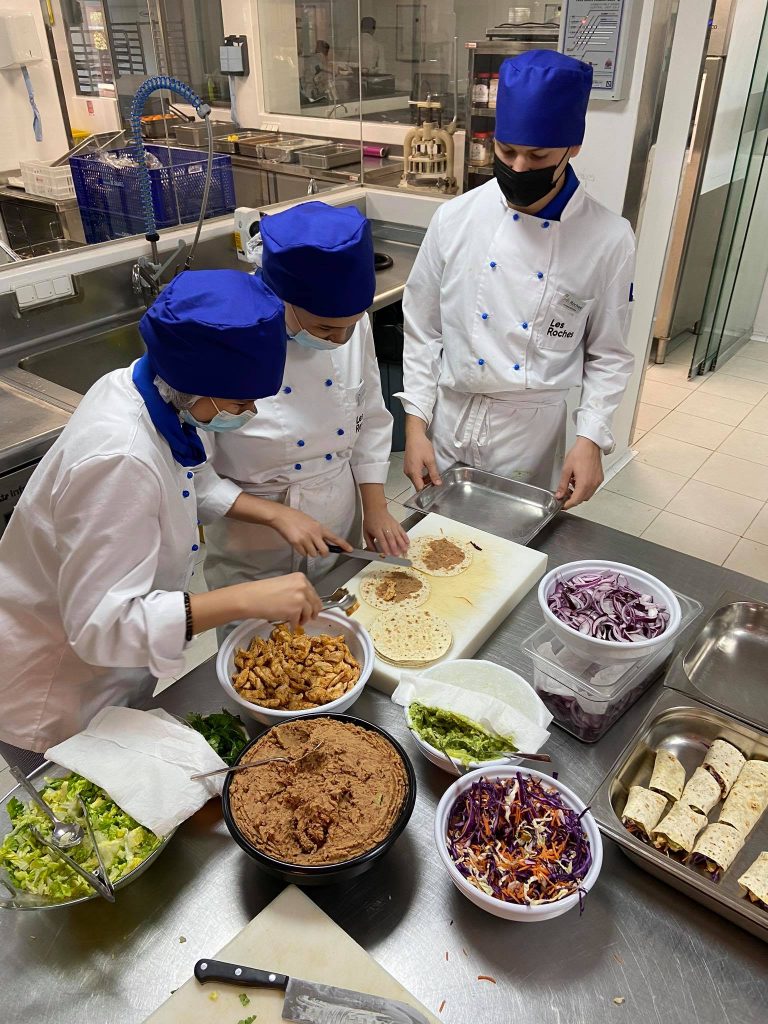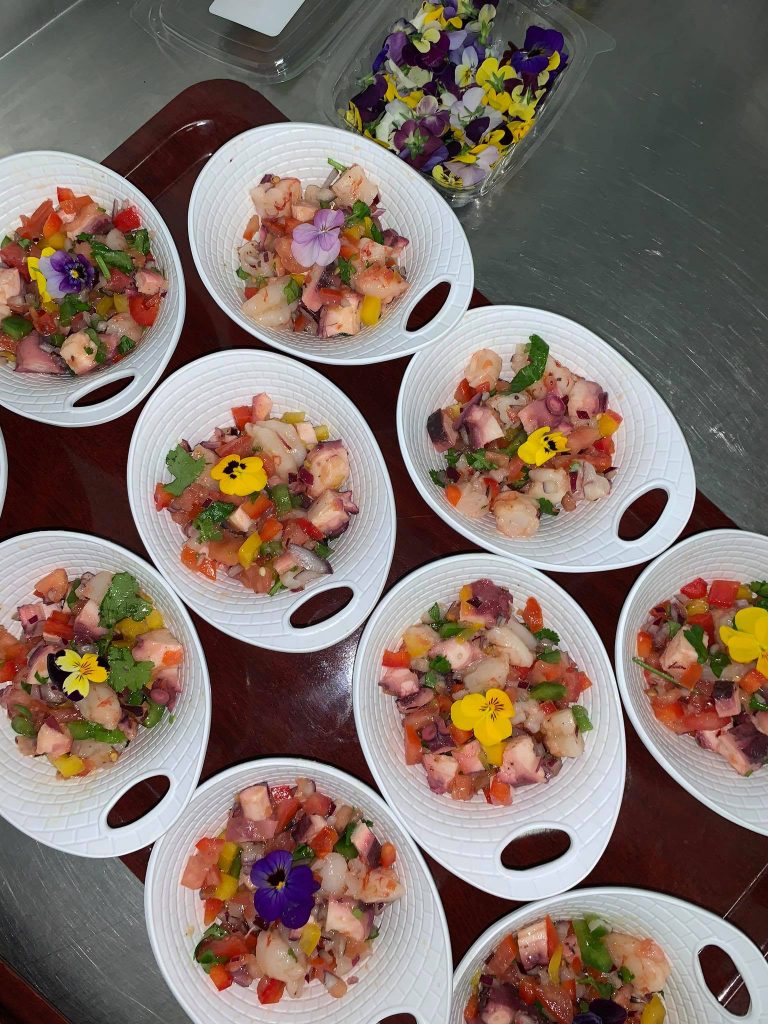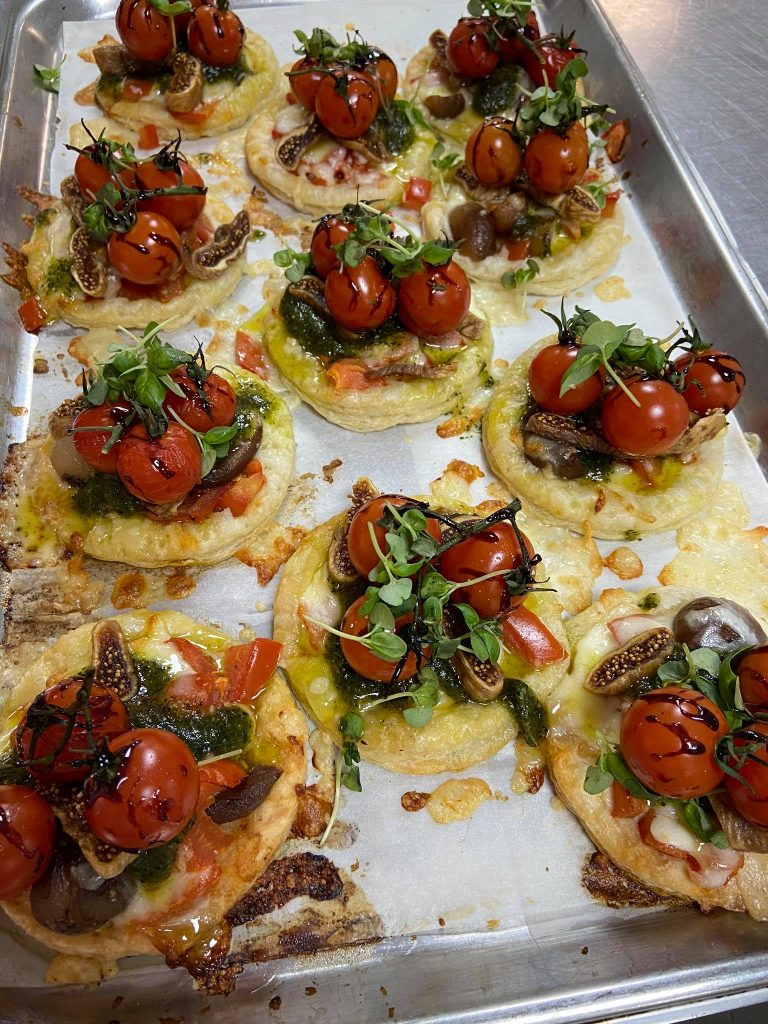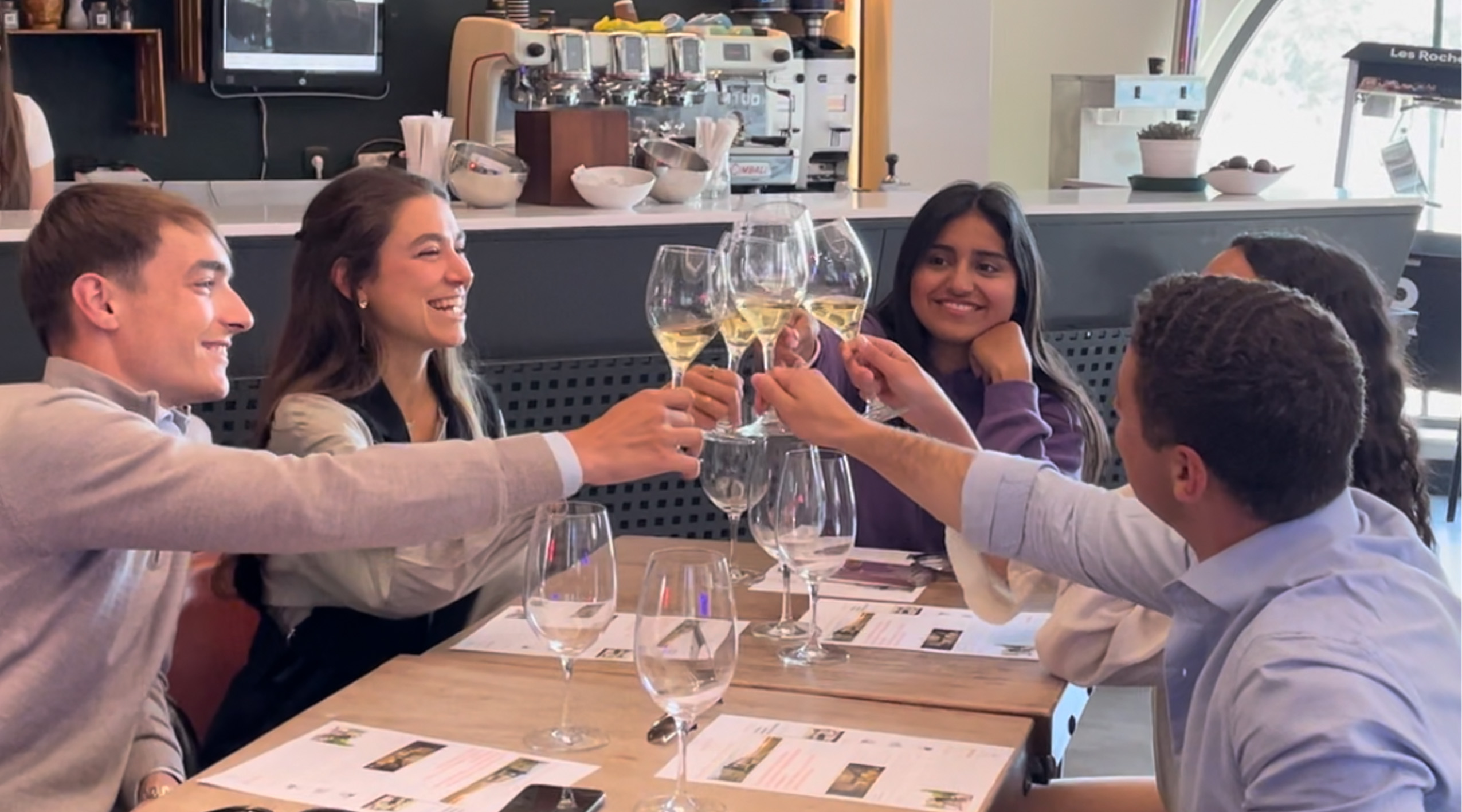For the past 2 weeks, I have been in practical arts training in the Food & Beverage department, specifically in kitchen operations as part of my first semester of the Bachelor’s in Global Hospitality Management. It was much more challenging for me than Service Week, both physically due to the early, long shifts (after which we had our usual classes) and mentally since I was not really experienced in the kitchen. This became clear when I was confronted with an exceptionally large and professionally-equipped kitchen with a lot of different equipment, cooking utensils, and kitchen machinery I had never seen before. That means we need to be very mindful and careful. These qualities were especially vital to managing various knife skills, such as boning, filleting, and quick cutting techniques. Other important and difficult tasks were finding products and dishes on their own shelves in the storage areas, locating the right cleaning equipment and using different sanitizers according to proper hygiene standards, energy conservation, and waste management. All these skills we gained in two absolutely different restaurants: House of Colors Bistro and Le Marche.

The first week took place in House of Colors Bistro. This restaurant offers a laid-back café environment and is the home of Les Roches Marbella’s deliciously famous burgers, as well as offering fresh salads, pastas, fish, and vegetarian dishes on its menu. That week we worked in teams and individually to produce quality Bistro food ranging from “modern free-flow concepts” and “fusion cuisine” to “a la carte” and “fast food” cooking in a busy setting. Also, we had two different chef instructors – one for lunch and another for dinner. They were completely different in their temper, manners of teaching, communicating with students, and in the general atmosphere of our training. For instance, I really liked our interactions with Mr. Suarez as he was very kind, offered his attention, advice, and help.
In the second week of kitchen operations, I started working at Le Marche’s cold section and it was mindblowing for me, in every way. Le Marche is a buffet-style dining outlet, serving breakfast, lunch, and dinner. It is well known by students for its international days each week. As you can imagine, we had a different chef, Chef Gastellier, in the Le Marche kitchen and I want to say that each chef changes your vision completely. First of all, there is quite a difference between the chefs’ concepts: Le Marche Chef, as Ms. Gastellier asked to call her, prepared us for the week in her kitchen by explaining we would be more creative and we will have to be open-minded about everything we will cook. I was inspired by the Chef’s message and the way she was working and teaching us. She was strict, but at the same time she really taught us a lot of new techniques, I could tell you about some of them.

Each morning we had to be in a clean kitchen uniform and complete the mise en place inspection to ensure everything was ready, including the kitchen’s collection of knives which we had to clean and sharpen every time after using. A small tip for you: at university, we have a laundry for our uniforms, where we can take fresh aprons from and put our dirty uniforms to wash. Another important thing I would like to mention is the rule of clean hands (hygiene standards). In each section of the kitchen, we set alarms every 20 minutes that remind us to wash our hands. And of course, I’d like to pay special attention to the cooking process by itself. For the whole week, we have been cooking, cutting, and making different salads, chef’s specials, and dishes for a cooking show. I have participated in each part of the process during the week and that’s how it went.
We were usually divided into small groups of people to work on one type of salad, in total we had four different salad types per shift. Also, we had to work on our main chef’s special dish. Our Chef was always with us, making us more organized and reminding us about our daily agenda using French cooking terminology. I enjoyed our interconnection with our Chef, it was hard and serious work, but also, we had a lot of fun. Every day we learned new recipes; we had a large and really varied menu. Furthermore, we created different themed menus every day: each day had its own national cuisine, based on unique cultures from around the world. It was really exciting to learn about new dishes from different international communities. As for me, my favorite ones were Italian and Spanish cuisines. I also learned that I really like different kinds of cheese and I had a unique chance to work with and try them. Also, I learned to prepare different seafood products, like octopus and prawns. At the end of the week, we had an opportunity to ask our Chef for a few recipes. As for me, I asked for a Guacamole and I intend to make it for my parents at home.

A recipe for Classic Guacamole.
Ingredients:
- 3-5 avocados
- 1 lime
- 1 teaspoon salt
- 1 lemon
Directions: cut avocados, place them in a medium bowl, mash together the avocados, lime/lemon juice and salt.
Serve immediately.
As you see, I have learned a lot of new skills and techniques during practical arts weeks. While I am sure it is a good beginning for people who would like to start their Food & Beverage career in the future, it is also important for anybody taking a career path in the hospitality industry as a whole. Also, kitchen practicals made me more responsible for my own actions and at the same time made me more effective as a team member. During these weeks I was strongly convinced that communications between teammates really determines success. Despite the fact we have already worked together before during our Bar and Service Operations block, we still had some issues to argue about, and not every time we had a consensus communicating with each other. It is quite challenging to listen to each other’s opinions, to accept another point of view and to fulfil decisions of the team adjusting your behavior to the team’s interests. As for me, these are the key principles for a fast and successful job.
To future Les Roches students, I would recommend staying patient and mindful. Most important to remember are the guidelines and rules which the chef is going to tell you, concerning both safety and the placement of all the staff. Every day we had team distribution of sections: during the cooking process you have to do your role, usually, in the morning you and your team spread roles between each other. One more tip for you is not to be scared to tell your team members if you have any concerns. It is, after all, just a studying process. You have to be open-minded, clever, and tolerant of others. Trust me, it is very difficult to be adequate at 6 am, but during these weeks you get used to doing it.
It was incredible how patiently and synchronized our team worked eventually. Each person had its own role in the team, but at the same time, we never left each other if we had any problems or if we were out of time. I feel that every week my team and I become stronger and more prepared for the next kitchen operations weeks together.
Concluding the experiences of these two weeks, I’d like to draw your attention to the significance of understanding the purposes of such practices. We are gaining very important skills, both operational and managerial, for our future job positions as managers in hospitality. The most pleasant part of this period of studying is that these skills are going to be useful in every life situation, such as cooking small dishes to share with your friends at a private party, sharing new recipes with your family, and organizing the necessary teams for restaurant projects in future.
I never thought that F&B could be so fascinating by itself, and it could be even more inspiring when you apply your skills with enthusiasm. In the coming weeks, I am looking to get more new knowledge and experience in the Food & Beverage Department to share with you in my future blogs!



